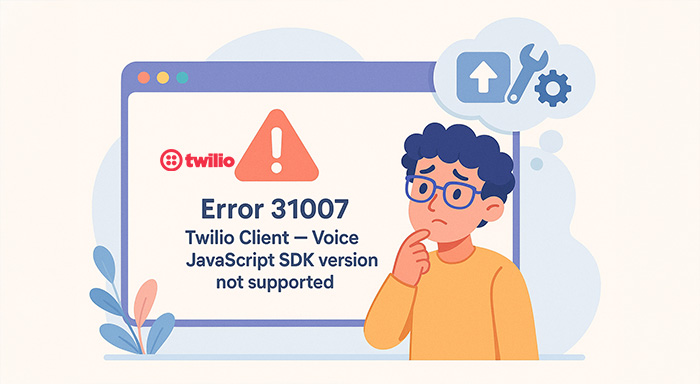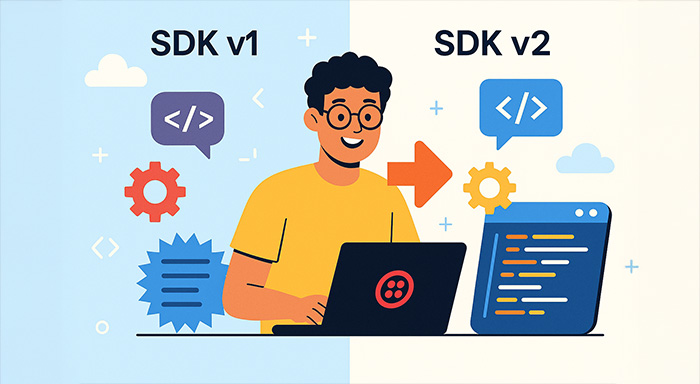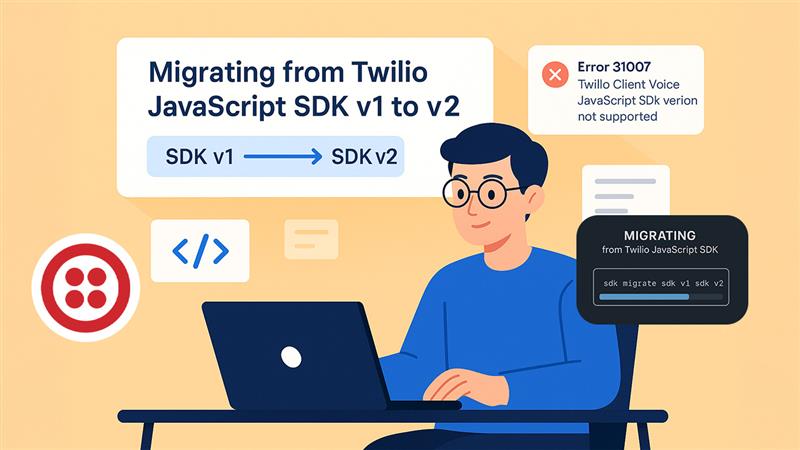Let’s suppose you’re running a voice web application for months and seamlessly manage calls through Twilio Voice JavaScript SDKs. Then suddenly your app stops working and you’re unable to make calls. Your browser console displays a cryptic error message:
Error 31007: Twilio Client: Voice JavaScript SDK version not supported.

The error indicates that the JavaScript client version (generally voice JavaScript SDK) used in your application is no longer supported by Twilio. Especially, if you’re still using JavaScript SDK 1.x version which Twilio has officially deprecated. With its upgraded 2.0x version, which is equipped with robust security updates, advanced features, and enhanced functionality, Twilio has stopped supporting its previous versions.
However, the only solution to resolve this error is to upgrade your applications by migrating from Twilio Voice JavaScript SDK v1 to v2 version.
When Deprecation Happens
As the Twilio deprecated JS SDK 1.x version, developers are suggested to upgrade to Twilio voice JS SDK 2.x version or greater before April 1, 2025. After September 10, 2025, version 1.x reaches its end of life (EOL), which means users can’t access their application with previous versions. However, this is more than just a suggestion, it’s required to continued functionality, seamless debugging, and advanced security upgrades.
Understand Twilio and How It Works
Twilio is a cloud communication platform designed to make and receive calls/SMS/Email/WhatsApp messages, allowing businesses to seamlessly interact with their clients. By integrating Twilio API Into their CRM, website, or App, businesses can automate manual dialing process, notifications, and customer support. Regardless of creating tedious telecommunication infrastructure, developers can utilize API to access communication tools and features with just a few lines of code. Twilio offers various APIs (Application Programming Interface) or SDKs (Software Development Kit) that developers use to integrate communication tools into their systems.
However, Twilio Voice JavaScript SDK serves as the medium between web browser and robust voice infrastructure of Twilio. This helps streamline everything from maintaining WebRTC connections to handling audio stream and system controls.
Understand SDKs and Why They’re Important
SDK, abbreviated as Software Development Kit, offers developers a comprehensive suite of integrated tools, libraries, and repositories to build applications effectively. Twilio SDKs play a critical role in integrating communication functionality into a wide range of applications. In the context of web-based voice applications, Twilio JavaScript SDK manages:
- Error Handling: Offering real-time, relevant error messages for error debugging, eliminating risks of system failure.
- Protected Link Administration: Setting up secure connections between web browser and Twilio’s backend, like software, application, and database.
- Device Management: Efficiently handle microphone, speaker, and other hardware access and switching.
- Real-Time Audio Analysis: Managing and storing real-time audio data without affecting the quality.
- Call Control: Managing call flows, like mute/unmute, hold, and hang up operations efficiently.
The Migration: From Twilio Voice JavaScript SDK v1 to v2

Twilio initially launched its JavaScript Voice SDK v1 to allow developers to integrate communication channels into web browsers. With rapid advancement in web standards, like optimized WebRTC, improved security updates, and sophisticated APIs, Twilio launches its ungraded version v2 with significant advancements.
Quick Comparison Between JS SDK v1 and v2
| Functionality | v1 (Older SDK 1.x Version) | v2 (Modern SDK 2.x Version) |
|---|---|---|
| WebRTC Technology | Pre WebRTC Execution with limited stability | Upgraded for highly advanced design patterns with robust WebRTC APIs. |
| Browser Compatibility | Needed polyfills to run on latest browsers | Foundational support for Chrome, Edge, Safari, and Firefox. |
| Security Infrastructure | Token management with basic security practices | Optimized token protection with restricted device accessibility |
| Audio Quality | Basic coded support and limited audio control | Modern codec agreements and background noise cancellation |
| API Infrastructure | Supports event-driven architecture | Offers result-oriented APIs for streamlined more structural code |
| Device Control | Require manual intervention for input/output device management | Ready-made APIs for responsive device rerouting |
| Error Reporting | Simple, classical error messages | Extensive error messages with codes and detailed debugging details |
| Adaptability | Restricted for enterprise grade applications | Designed for large call centers and large-scale deployments |
Why Migration Is Essential
Limitation in Twilio Voice JavaScript SDK v1
If you are still using v1, your applications may face several critical challenges, like degraded performance and reliability issues.
- Lack of Browser Compatibility: Sophisticated browsers don’t support older WebRTC implementations that v1 depends on.
- Security Risks: Outdated models and pending updates may create potential vulnerability to your applications against threats.
- Basic Feature Accessibility: With SDK 1.x version, you cannot access advanced features, like audio quality optimization and device management capabilities.
- Deprecated Support System: Doesn’t provide debugging, continuous updates, and post implementation support.
Key Advancement of Upgrading to v2
If your browser displays this error 31007: Twilio Client: Voice JavaScript SDK version not supported. It means your application is using outdated SDK v1 version, so you may need to upgrade your system from Twilio Voice JavaScript SDK v1 to v2 version. This migration to v2 results in several considerable advancements, such as
- Improved Dependency: Offers stronger connection stability and smooth call quality, keeping communication fast and secure with enhanced reliability.
- Streamline Developer Expertise: Promise-driven APIs facilitate workflow by minimizing callback complexity, providing clear, maintainable, and more user-friendly code.
- Modern Functionality: With advanced features like strong device switching, improved codec management, and integrated noise cancellation.
- Long-lasting Architecture: Developed with sustainable, forward-looking architecture that can support dynamic web standards and browser updates to keep your system scalable and compatible.
- Smart Debugging Tools: Extensive error handling capabilities help you identify issues promptly, making troubleshooting accessible and streamlined.
Remember that v2 security protocols function smoothly with TwiML applications, which represents how system handles your voice calls by using XML-based instructions. So, ensure your system is configured with secure HTTPs endpoints and Access tokens to maintain compatibility between TwiML applications and upgraded SDK 2.0x version.
For Example: For CRM-integrated businesses, this migration ensures compatibility with advanced tools like SuiteCRM8 Click to Call. This ensures automating manual dialing process with one-click directly from CRM by leveraging the security benefits of SDK v2.0x version.
Essential Migration Challenges and Potential Solutions
1. Token Generation Issues
Problem: Older credential format or Outdated encryption flows may not work with Twilio Voice JavaScript SDK v2 version upgrade.
Solution: Keep your token generation logic aligned with modern security practices and SDK needs. Utilize latest libraries and authenticated token lifecycle to prevent errors.
2. Event Handling Modifications
Problem: Callback-based model, and promise-based model may differ between versions that may create conflict.
Solution: leverage latest event handling patterns, Reconnection states, and refactored code, as well as continuously update token generation logic.
3. Limited Device Accessibility
Problem: Legacy network configuration stems from access failures of microphones.
Solution: Execute clear permission request flows, test the application across different browsers for consistent access with v2's robust security model.
4. Audio Quality Issues
Problem: After Migration, users may face poor call quality due to codec misalignment, overlooked enhancements, or inconsistent network conditions.
Solution: Leverage advanced audio processing features like noise cancellation, robust device switching, and improved codec negotiation in SDK 2.x upgrade.
Final Words: Upgrade Your Twilio Voice Applications
Twilio Voice JavaScript SDK v1 is fully deprecated to September 10, 2025. If you’re still using this version, you may probably face this error 31007:Twilio Client: Voice JavaScript SDK version not supported.
It’s not just an error; it’s an indication that your system doesn’t support the older SDK version. To keep your application running smoothly, it’s time to upgrade deprecated Twilio Voice JavaScript SDK v1 to v2 version. This strategic move is crucial to protect your voice application against future vulnerabilities. Twilio Voice JS SDK 2.0x offers versatile architecture, smart development features, improved performance, and smooth experience for both users and developers. Now that the deprecation date has passed, applications built on previous version will no longer run, upgrading to SDK v2 is essential for a smoother and more reliable experience.
How OutRight Store Supports Migration to Twilio SDK v2
Migrating from Twilio Voice JavaScript SDK v1 to v2 is more than a technical requirement, it’s a critical shift to ensure uninterrupted functionality. For businesses looking to upgrade their application to JS SDK v2, reliable Twilio service providers like OutRight Store offer unprecedent support throughout the process. This platform has become a powerful ally for businesses that reduce downtime, mitigate call failures, and resolve compliance challenges.
OutRight Store offers a robust solution that identifies deprecated SDK dependencies, generates security tokens, manages even management changes, and refactors both incoming and outcoming call logic. By addressing these key factors, we help businesses shift to SDK 2.0x version quicky, keeping productivity and customer trust intent.
After the deprecation of SDK v1, many clients faced error 31007: Twilio Client: Voice JavaScript SDK version not supported. We help them provide timely migration, long-term scalability, and expert support. Let’s explore what our clients have to say about their experience with us:
Our Clients’ Testimonials
“I am Mike Hanson from GreyStone. I have been using a dialer for 4 years created by outright systems. The dialer suddenly stopped working around 1st September and was asking V1 to V2 upgrade, I contacted outright again. They provided us with an upgraded dialer within 3 working days, and my business resumed instantly. Thanks to the team for their great support and instant attention.”
“Myself Leo, from Italy. I’ve been using a dialer created by OutRight for over 6 years, but I am not a tech person. Early September my agents were unable to send / receive calls, I contacted Outright systems again. Within 2 days, they upgraded our Dialer, now calling works better than previous dialer. Thanks OutRight and Ashish for their excellent support.”
These testimonials highlight how timely migration, and expert support can prevent disruptions. With Outright Systems, businesses don’t just fix errors like —they also gain access to enhanced stability, advanced features, and long-term scalability.
Note: Migrating to Twilio SDK v2 is just the beginning. If you’re already integrating Twilio with SuiteCRM, you can add more value with smart extensions like Twilio Auto Dialer for SuiteCRM and SuiteCRM SMS Drip Campaign using Twilio. These tools help you keep your communication streamlined, enhance operational efficiency, and elevate client interaction.








